 This story by Patricia Grace paints a poignant picture of an elderly woman who has lived alone for fifteen years after her husband’s death. She comforts herself by imagining him as a star which, along with other loved ones who have since died, watches over her at night. She has given away most of her belongings and lives a spartan but contented life, ever watchful for visitors who never come and listening for a telephone that never rings. As the story ends, she “wakes” to find her bed surrounded by dancing stars. Themes include independence, ageing with grace, contentment, loneliness. More…
This story by Patricia Grace paints a poignant picture of an elderly woman who has lived alone for fifteen years after her husband’s death. She comforts herself by imagining him as a star which, along with other loved ones who have since died, watches over her at night. She has given away most of her belongings and lives a spartan but contented life, ever watchful for visitors who never come and listening for a telephone that never rings. As the story ends, she “wakes” to find her bed surrounded by dancing stars. Themes include independence, ageing with grace, contentment, loneliness. More…
Category Archives: Short Stories
The Tale
 In this story by Joseph Conrad, a man tells his lover a tale about an English naval captain (who she later deduces to be him) racked with guilt over a decision made at sea. While sheltering from fog, he encountered a trading ship which he became increasingly suspicious of being a privateer supplying fuel to enemy U-boats. However, the ship’s papers were in order. With no legal basis for seizing the ship, he found a way to send it and all on board to their doom without firing a shot. Themes include duty vs. morality in war, guilt. More…
In this story by Joseph Conrad, a man tells his lover a tale about an English naval captain (who she later deduces to be him) racked with guilt over a decision made at sea. While sheltering from fog, he encountered a trading ship which he became increasingly suspicious of being a privateer supplying fuel to enemy U-boats. However, the ship’s papers were in order. With no legal basis for seizing the ship, he found a way to send it and all on board to their doom without firing a shot. Themes include duty vs. morality in war, guilt. More…
The Delicate Prey
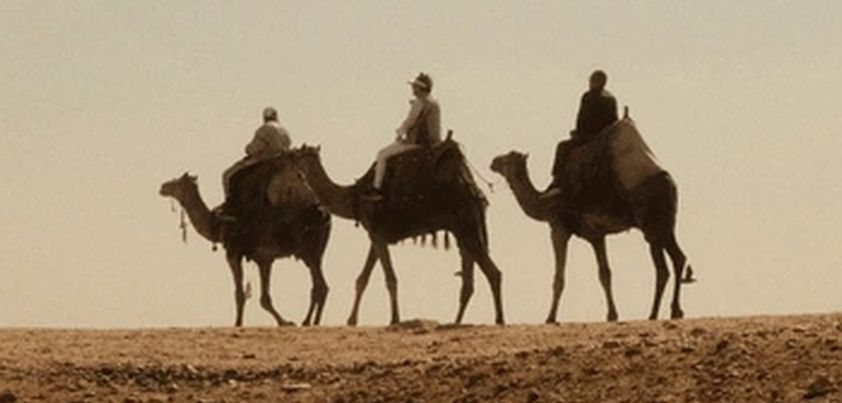 This controversial story by Paul Bowles is not for the squeamish. Two leather merchants and their nephew set off across the Algerian desert to sell their wares. After several days a stranger fearful of bandits in the area approaches and asks to accompany them. One night, the stranger lures the merchants away from camp on the pretext of going hunting. He ambushes and shoots them, then tortures and kills the youth. The crime is discovered when the stranger tries to sell their distinctive leatherworks. Tribal justice is swift and brutal. Themes include greed, deceit, extreme violence, vengeance. More…
This controversial story by Paul Bowles is not for the squeamish. Two leather merchants and their nephew set off across the Algerian desert to sell their wares. After several days a stranger fearful of bandits in the area approaches and asks to accompany them. One night, the stranger lures the merchants away from camp on the pretext of going hunting. He ambushes and shoots them, then tortures and kills the youth. The crime is discovered when the stranger tries to sell their distinctive leatherworks. Tribal justice is swift and brutal. Themes include greed, deceit, extreme violence, vengeance. More…
Mahesh / The Drought
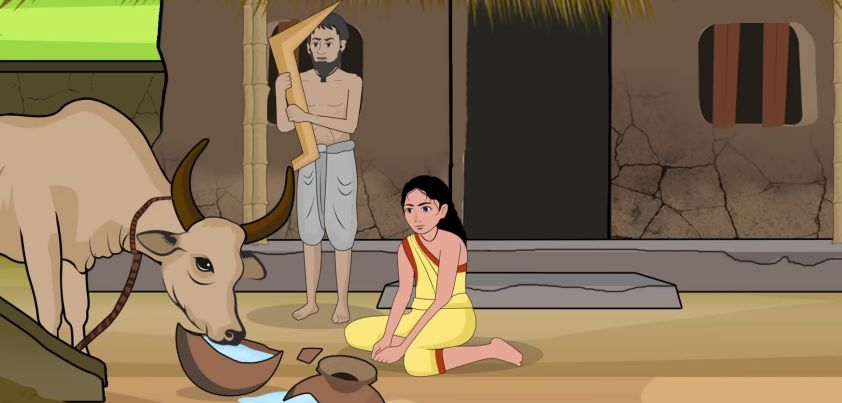 This story by Sarat Chandra Chattopadhyay highlights the plight of the rural poor in colonial India. After years of drought, a landless Indian farmer lives on handouts, sharing what little he and his daughter have with Mahesh, his beloved bull. After the starving animal escapes and raids his cruel zamindar’s garden, the poor man is severely beaten and given a heavy fine. Angry and frustrated when Mahesh later breaks a pitcher of precious water, he does the unthinkable. Themes include poverty, social injustice (exploitation and deprivation), devotion/human-animal bonding, the potential devastating effects of nature on rural communities. More…
This story by Sarat Chandra Chattopadhyay highlights the plight of the rural poor in colonial India. After years of drought, a landless Indian farmer lives on handouts, sharing what little he and his daughter have with Mahesh, his beloved bull. After the starving animal escapes and raids his cruel zamindar’s garden, the poor man is severely beaten and given a heavy fine. Angry and frustrated when Mahesh later breaks a pitcher of precious water, he does the unthinkable. Themes include poverty, social injustice (exploitation and deprivation), devotion/human-animal bonding, the potential devastating effects of nature on rural communities. More…
Old Woman Magoun
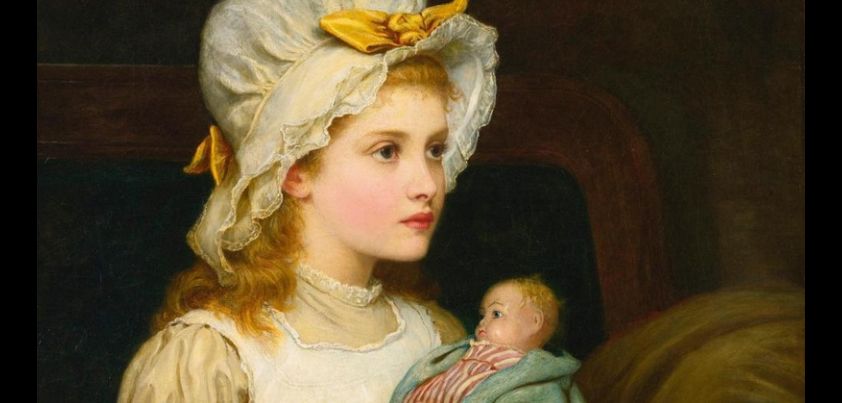 In this story by Mary R. Wilkins Freeman an old woman takes drastic action to prevent her granddaughter’s father from trafficking her to settle a gambling debt. The girl’s mother had died shortly after she was born. Wary of the shiftless, hard drinking men of the town, the grandmother had raised her in sheltered isolation. Now fourteen and innocent to the ways of the world, her father demands that she be handed over. Desperate, the grandmother turns to nature to “spare” her. Themes include patriarchy and gender roles, overprotectiveness, alcohol abuse, human trafficking, innocence, piety, love, despair, mercy killing. More…
In this story by Mary R. Wilkins Freeman an old woman takes drastic action to prevent her granddaughter’s father from trafficking her to settle a gambling debt. The girl’s mother had died shortly after she was born. Wary of the shiftless, hard drinking men of the town, the grandmother had raised her in sheltered isolation. Now fourteen and innocent to the ways of the world, her father demands that she be handed over. Desperate, the grandmother turns to nature to “spare” her. Themes include patriarchy and gender roles, overprotectiveness, alcohol abuse, human trafficking, innocence, piety, love, despair, mercy killing. More…
Sredni Vashtar
 In this dark story by Saki, a sickly ten-year-old boy masks his hatred for the “Woman”, a controlling guardian who thwarts his every pleasure in his life. To cope, he acts out fantasies in a disused tool-shed in a forgotten corner of her garden. There, in response to the Woman’s religious zeal, he worships a caged polecat-ferret named Sredni Vashtar. When she notices his absorption in the tool-shed and tries to clear it out, Sredni Vashtar answers his prayers. Themes include oppression vs. freedom, isolation and loneliness, imagination vs. reality, religion, rebellion, revenge. More…
In this dark story by Saki, a sickly ten-year-old boy masks his hatred for the “Woman”, a controlling guardian who thwarts his every pleasure in his life. To cope, he acts out fantasies in a disused tool-shed in a forgotten corner of her garden. There, in response to the Woman’s religious zeal, he worships a caged polecat-ferret named Sredni Vashtar. When she notices his absorption in the tool-shed and tries to clear it out, Sredni Vashtar answers his prayers. Themes include oppression vs. freedom, isolation and loneliness, imagination vs. reality, religion, rebellion, revenge. More…
Three Girls
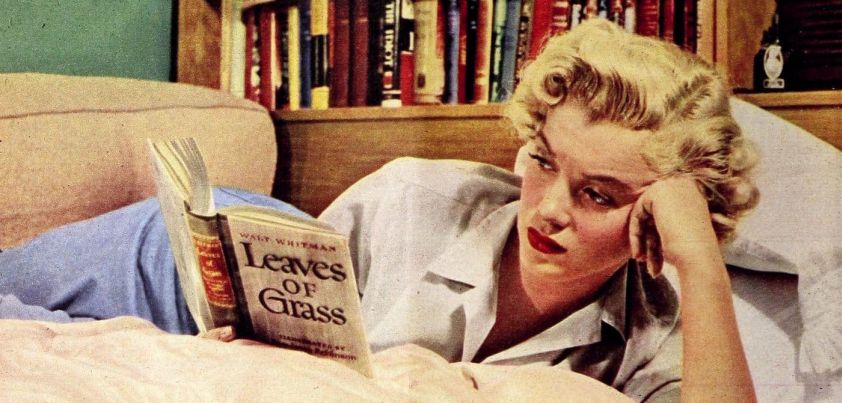 In this story by Joyce Carol Oates a woman recalls when, as a college student, she and a fellow girl-poet encountered a woman they believed to be a heavily disguised Marilyn Monroe browsing in a used bookstore. Torn between acknowledging the woman and protecting her privacy, they choose the latter. “Marilyn” gives them a book as a memento and leaves. For the girls, who are coming to grips with their sexuality and mutual attraction against social norms of the time, the shared experience triggers a first kiss. Themes include identity, gender norms, sexuality, passion, courage, stereotypes. More…
In this story by Joyce Carol Oates a woman recalls when, as a college student, she and a fellow girl-poet encountered a woman they believed to be a heavily disguised Marilyn Monroe browsing in a used bookstore. Torn between acknowledging the woman and protecting her privacy, they choose the latter. “Marilyn” gives them a book as a memento and leaves. For the girls, who are coming to grips with their sexuality and mutual attraction against social norms of the time, the shared experience triggers a first kiss. Themes include identity, gender norms, sexuality, passion, courage, stereotypes. More…
Punishment
 The central theme of this story by Rabindranath Tagore is the dehumanization of women under India’s patriarchal social structure. When a farmer murders his wife in a fit of rage, his brother asks his wife to take the blame, promising to testify that she did it in self-defence. In court she denies this, pleads guilty, and is sentenced to hang. For her, love and hope died when her husband asked her to lie and she saw death as preferable to a life of misery. Other themes include poverty, exploitation, jealousy, betrayal, the unpredictable consequences of a lie. More…
The central theme of this story by Rabindranath Tagore is the dehumanization of women under India’s patriarchal social structure. When a farmer murders his wife in a fit of rage, his brother asks his wife to take the blame, promising to testify that she did it in self-defence. In court she denies this, pleads guilty, and is sentenced to hang. For her, love and hope died when her husband asked her to lie and she saw death as preferable to a life of misery. Other themes include poverty, exploitation, jealousy, betrayal, the unpredictable consequences of a lie. More…
In Memory of Pauline
 In this story by Adolfo Bioy Casares, childhood sweethearts grow up believing their “souls are united”. From the man’s perspective: Life was a pleasant habit which led us to look upon our eventual marriage as something natural and certain. He takes the relationship for granted, doesn’t express his love, and she marries someone else. Shattered, he accepts a two-year scholarship to study abroad. On his return, she visits his apartment and falls into his arms. When he goes looking for her the next day, a friend has shocking news. Themes include childhood love, complacency, jealousy, loss, memory, the supernatural. More…
In this story by Adolfo Bioy Casares, childhood sweethearts grow up believing their “souls are united”. From the man’s perspective: Life was a pleasant habit which led us to look upon our eventual marriage as something natural and certain. He takes the relationship for granted, doesn’t express his love, and she marries someone else. Shattered, he accepts a two-year scholarship to study abroad. On his return, she visits his apartment and falls into his arms. When he goes looking for her the next day, a friend has shocking news. Themes include childhood love, complacency, jealousy, loss, memory, the supernatural. More…
The Lighthouse
 In this story by H. E. Bates a man recovering from a troubled marriage begins a passionate affair with a lonely woman working at a beach-side café. The climax is his sense of confusion, anger, and betrayal when, having lied and told her he is single, he learns she is also married. Her husband works away from home and returns on weekends. For her, the relationship with the man appears primarily sexual. She presses him to remain her mid-week lover, and he could well be too weak-willed to refuse. Themes include isolation, loneliness, insecurity, sexuality, deception, jealousy. More…
In this story by H. E. Bates a man recovering from a troubled marriage begins a passionate affair with a lonely woman working at a beach-side café. The climax is his sense of confusion, anger, and betrayal when, having lied and told her he is single, he learns she is also married. Her husband works away from home and returns on weekends. For her, the relationship with the man appears primarily sexual. She presses him to remain her mid-week lover, and he could well be too weak-willed to refuse. Themes include isolation, loneliness, insecurity, sexuality, deception, jealousy. More…
The Living
 In this story by Mary Lavin, a boy challenges a younger friend to visit a wake to “know” a corpse for the first time The dead man, who had been intellectually challenged since birth, had never had contact with children. The boys agree when his mother invites them to pray over the body, but flee when she asks them to stroke it. The encounter with death not only brings the younger boy closer to his parents but also highlights the grim significance of his family’s nightly prayer. Themes include bravado, death, family, the precious and capricious nature of life. More…
In this story by Mary Lavin, a boy challenges a younger friend to visit a wake to “know” a corpse for the first time The dead man, who had been intellectually challenged since birth, had never had contact with children. The boys agree when his mother invites them to pray over the body, but flee when she asks them to stroke it. The encounter with death not only brings the younger boy closer to his parents but also highlights the grim significance of his family’s nightly prayer. Themes include bravado, death, family, the precious and capricious nature of life. More…
The Old Aunt / Boodhi Kaki
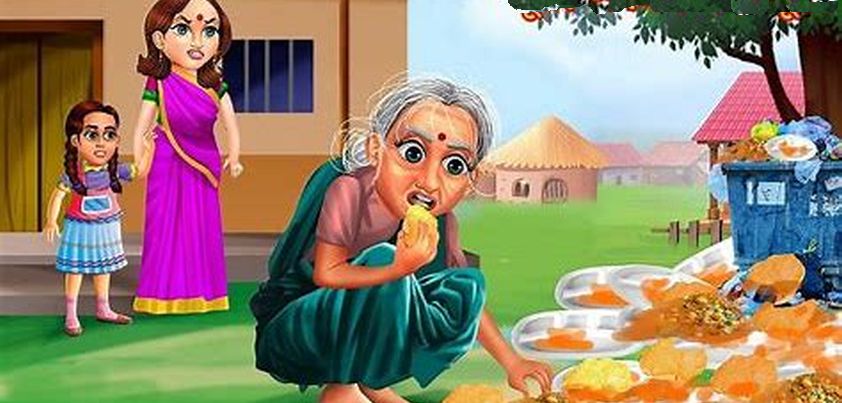 In this story by Premchand a Hindu woman is overcome with pity and fear of adharma (divine punishment for selfishness and injustice) when she sees her husband’s disabled aunt foraging for food among banquet leftovers. The aunt, who has no other living relative, had previously transferred her entire property to the woman’s family in exchange for a promise of care. Rather than being cared for she has been treated inhumanely, often being left hungry and alone in her room for long periods. Themes include greed, betrayal, the plight of the infirm, responsibility, neglect, redemption, kindness. More…
In this story by Premchand a Hindu woman is overcome with pity and fear of adharma (divine punishment for selfishness and injustice) when she sees her husband’s disabled aunt foraging for food among banquet leftovers. The aunt, who has no other living relative, had previously transferred her entire property to the woman’s family in exchange for a promise of care. Rather than being cared for she has been treated inhumanely, often being left hungry and alone in her room for long periods. Themes include greed, betrayal, the plight of the infirm, responsibility, neglect, redemption, kindness. More…
Scent of Apples
 Set during World War 2, this story by Bienvenido Santos explores the cultural displacement experienced by the thousands of Filipino men who emigrated to America in the first half of last Century. For an apple farmer who has lived in America for twenty years, the omnipresent scent of apples is a constant reminder of the difference between the two countries. Surprisingly, despite having a loving American family, he is anxious to know how much Filipino women have changed and can’t help thinking of what might otherwise have been. Themes include family, choices and consequences, cultural identity, alienation, isolation, nostalgia, connection. More…
Set during World War 2, this story by Bienvenido Santos explores the cultural displacement experienced by the thousands of Filipino men who emigrated to America in the first half of last Century. For an apple farmer who has lived in America for twenty years, the omnipresent scent of apples is a constant reminder of the difference between the two countries. Surprisingly, despite having a loving American family, he is anxious to know how much Filipino women have changed and can’t help thinking of what might otherwise have been. Themes include family, choices and consequences, cultural identity, alienation, isolation, nostalgia, connection. More…
The Crowd
 In this chilling story by Ray Bradbury, a man badly injured in a car accident senses something ominous about the onlookers in the crowd that gathered around him. Several weeks later, he notices these same individuals at another accident. He searches newspaper archives and discovers that they and similar groups had attended hundreds of accidents over the last decade. Their sinister purpose is revealed when he has another car crash and they decide to “make him more comfortable”. Themes include morbid curiosity, schadenfreude, anonymity and the possibility of evil in a crowd, the supernatural. More…
In this chilling story by Ray Bradbury, a man badly injured in a car accident senses something ominous about the onlookers in the crowd that gathered around him. Several weeks later, he notices these same individuals at another accident. He searches newspaper archives and discovers that they and similar groups had attended hundreds of accidents over the last decade. Their sinister purpose is revealed when he has another car crash and they decide to “make him more comfortable”. Themes include morbid curiosity, schadenfreude, anonymity and the possibility of evil in a crowd, the supernatural. More…
The Old Demon
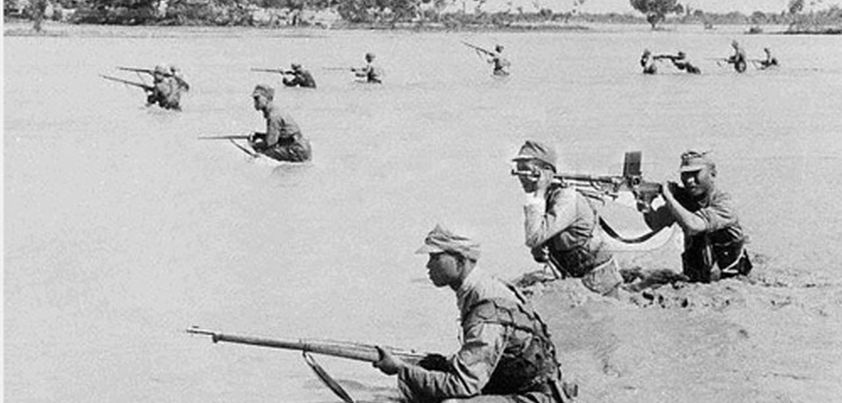 In this story by Pearl S. Buck, the widowed matriarch of a small Chinese village is too old to flee when it is bombed during the Second Sino-Japanese War. Left alone, she tends to a dying Japanese pilot and refuses to allow his body to be defiled by Chinese soldiers fleeing an advancing Japanese army. With help from her “Old Demon” (the Yellow River), she single-handedly stops the advance, saving her family and thousands of other villagers. Themes include family, change, the unpredictability and power of nature, the brutality of war, humanity, sacrifice. More…
In this story by Pearl S. Buck, the widowed matriarch of a small Chinese village is too old to flee when it is bombed during the Second Sino-Japanese War. Left alone, she tends to a dying Japanese pilot and refuses to allow his body to be defiled by Chinese soldiers fleeing an advancing Japanese army. With help from her “Old Demon” (the Yellow River), she single-handedly stops the advance, saving her family and thousands of other villagers. Themes include family, change, the unpredictability and power of nature, the brutality of war, humanity, sacrifice. More…
The Daemon Lover
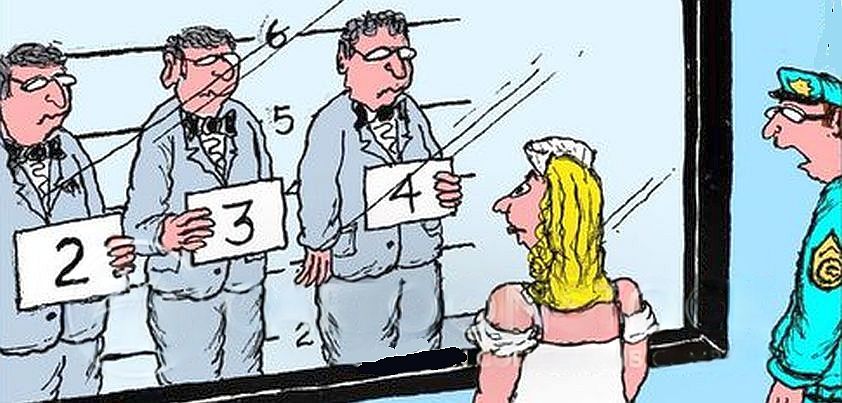 In this haunting psychological horror story by Shirley Jackson a woman wakes on what was to be her wedding day to realize that: 1) she may have been used and duped by a dapper writer’s promise of marriage; and 2) contrary to social expectations of the day, she may find herself “left on the shelf” at age thirty-four. In her desperatione to find the man she shows signs of mental instability, questioning whether the proposal was real or imagined. Themes include isolation and loneliness, social pressure, manipulation, imagination vs. reality, denial, obsession. More…
In this haunting psychological horror story by Shirley Jackson a woman wakes on what was to be her wedding day to realize that: 1) she may have been used and duped by a dapper writer’s promise of marriage; and 2) contrary to social expectations of the day, she may find herself “left on the shelf” at age thirty-four. In her desperatione to find the man she shows signs of mental instability, questioning whether the proposal was real or imagined. Themes include isolation and loneliness, social pressure, manipulation, imagination vs. reality, denial, obsession. More…
The Year of Spaghetti
 This story by Haruki Murakami describes how a reclusive man made 1971 his “year of Spaghetti”. After buying the necessary equipment and ingredients, he set out to cook spaghetti every day of the year. He cooked spaghetti to live and lived to cook spaghetti, comparing it to an act of revenge against his fears and feelings of meaningless isolation. Although he always eats alone, he often imagines someone standing outside about to visit. When his peace is shattered by a desperate phone call from an ex-friend’s ex-girlfriend, he declines to get involved. Themes include loneliness, self-alienation, obsession, futility. More…
This story by Haruki Murakami describes how a reclusive man made 1971 his “year of Spaghetti”. After buying the necessary equipment and ingredients, he set out to cook spaghetti every day of the year. He cooked spaghetti to live and lived to cook spaghetti, comparing it to an act of revenge against his fears and feelings of meaningless isolation. Although he always eats alone, he often imagines someone standing outside about to visit. When his peace is shattered by a desperate phone call from an ex-friend’s ex-girlfriend, he declines to get involved. Themes include loneliness, self-alienation, obsession, futility. More…
The Assignment
 This story by Saadat Hasan Manto takes place during the rioting that followed India’s Partition. Set in an “Indian” border town from which most Muslims have fled, an elderly judge underestimates the carnage to come and insists on staying. After a stroke, he becomes bed-ridden and is unable to flee. Every night, his seventeen-year-old daughter watches Muslim houses burning in the city around them. When a Sikh man repays a kindness the judge had once done for his father, we learn the reason their house has (so far) been spared. Themes include religious conflict, denial, fear, innocence, duty, betrayal. More…
This story by Saadat Hasan Manto takes place during the rioting that followed India’s Partition. Set in an “Indian” border town from which most Muslims have fled, an elderly judge underestimates the carnage to come and insists on staying. After a stroke, he becomes bed-ridden and is unable to flee. Every night, his seventeen-year-old daughter watches Muslim houses burning in the city around them. When a Sikh man repays a kindness the judge had once done for his father, we learn the reason their house has (so far) been spared. Themes include religious conflict, denial, fear, innocence, duty, betrayal. More…
The Olive
 In this lesser-known story by Algernon Blackwood, a playful girl accompanying her convalescing mother on the Italian Riviera rolls an olive across a restaurant floor to see who it chooses. A young man picks it up and takes it to his room. That night, he has an erotic dream featuring the girl, naked fauns, nymphs and satyrs, and an encounter with God. He meets the girl the next day and they begin a passionate affair during which she repeats several things she said and did in the dream. Themes include fate vs. chance, love, the supernatural. More…
In this lesser-known story by Algernon Blackwood, a playful girl accompanying her convalescing mother on the Italian Riviera rolls an olive across a restaurant floor to see who it chooses. A young man picks it up and takes it to his room. That night, he has an erotic dream featuring the girl, naked fauns, nymphs and satyrs, and an encounter with God. He meets the girl the next day and they begin a passionate affair during which she repeats several things she said and did in the dream. Themes include fate vs. chance, love, the supernatural. More…
A Cold Autumn
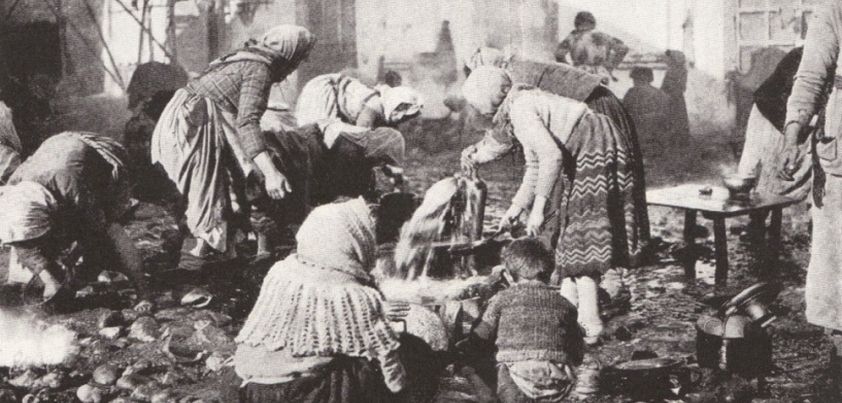 In this story by Ivan Bunin, a Russian woman reflects on a cold autumn morning thirty years earlier when she saw her fiancé off to war, never to return. After this, despite moments of happiness, her life spirals downward … she loses her parents and the family estate during the Revolution, ekes out a living in a Moscow market, marries but loses her husband two years later, and toils to raise his nephew’s infant daughter. She struggles on thanks to his commitment to wait for her in the afterlife. Themes include love, death, loss, time, memories, displacement, perseverance.. More…
In this story by Ivan Bunin, a Russian woman reflects on a cold autumn morning thirty years earlier when she saw her fiancé off to war, never to return. After this, despite moments of happiness, her life spirals downward … she loses her parents and the family estate during the Revolution, ekes out a living in a Moscow market, marries but loses her husband two years later, and toils to raise his nephew’s infant daughter. She struggles on thanks to his commitment to wait for her in the afterlife. Themes include love, death, loss, time, memories, displacement, perseverance.. More…
The Story of a Disappearance and an Appearance
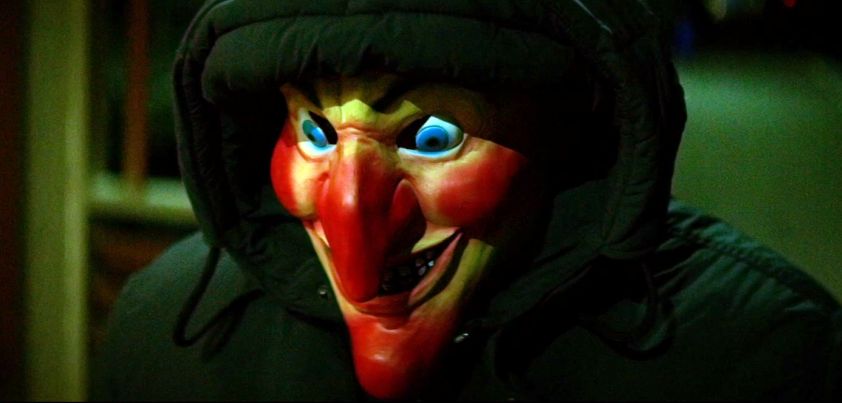 This story by M. R. James is in the form of four letters a man sends his brother as he travels to a small village to investigate the disappearance of their uncle. After an extensive search the uncle, a clergyman, is presumed dead. A highlight of the story is a vivid dream the nephew has of a frightening, life-like Punch and Judy show. This foreshadows the denouement… When a real Punch and Judy show comes to town the next day, the missing man rises from the dead and exacts vengeance. Themes include mystery, murder, revenge, justice, the supernatural. More…
This story by M. R. James is in the form of four letters a man sends his brother as he travels to a small village to investigate the disappearance of their uncle. After an extensive search the uncle, a clergyman, is presumed dead. A highlight of the story is a vivid dream the nephew has of a frightening, life-like Punch and Judy show. This foreshadows the denouement… When a real Punch and Judy show comes to town the next day, the missing man rises from the dead and exacts vengeance. Themes include mystery, murder, revenge, justice, the supernatural. More…
The Secret Source
 The world described in this Ben Okri story is not a pleasant place. Cities are decaying, rivers and oceans are so polluted they contain no life, ground water is undrinkable, and households are limited to just fifteen minutes of tap water a day. When a couple discover this is synthetic and contains chemicals designed to reduce dissent among the population, they embark on a quest to find a source of pure water. The ambiguous denouement encourages readers to ponder what life would be like in a world without freshwater. Themes include environmental degradation, urban decay, government manipulation and control. More…
The world described in this Ben Okri story is not a pleasant place. Cities are decaying, rivers and oceans are so polluted they contain no life, ground water is undrinkable, and households are limited to just fifteen minutes of tap water a day. When a couple discover this is synthetic and contains chemicals designed to reduce dissent among the population, they embark on a quest to find a source of pure water. The ambiguous denouement encourages readers to ponder what life would be like in a world without freshwater. Themes include environmental degradation, urban decay, government manipulation and control. More…
The Sisters
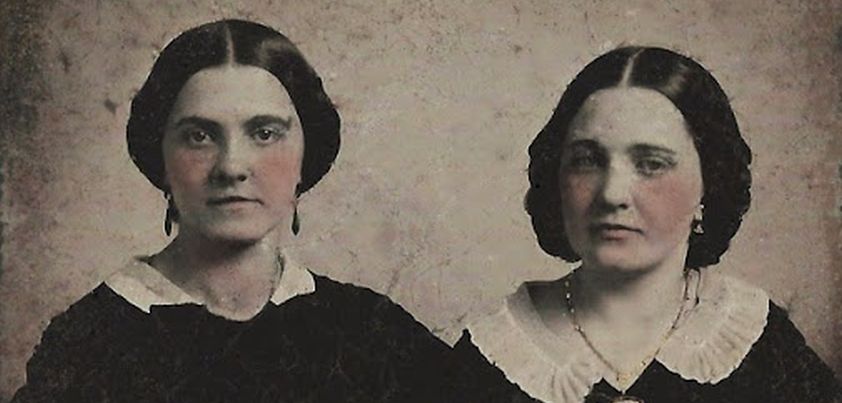 Several themes in this story by James Joyce (paralysis, corruption and abuse of authority) are said to represent major issues facing both Ireland and its Catholic Church in the early 1900s. The story, which takes place shortly after the death of a Catholic priest, is narrated by a boy who was friends with and mentored by the cleric. He is angered by insinuations the priest was involved in a scandal but also feels “freed”, presumably because he can resume a normal boyhood. Other themes include religion, secular vs. religious education, fall from grace, mental illness, loneliness, death, “freedom”. More…
Several themes in this story by James Joyce (paralysis, corruption and abuse of authority) are said to represent major issues facing both Ireland and its Catholic Church in the early 1900s. The story, which takes place shortly after the death of a Catholic priest, is narrated by a boy who was friends with and mentored by the cleric. He is angered by insinuations the priest was involved in a scandal but also feels “freed”, presumably because he can resume a normal boyhood. Other themes include religion, secular vs. religious education, fall from grace, mental illness, loneliness, death, “freedom”. More…
The Switchman
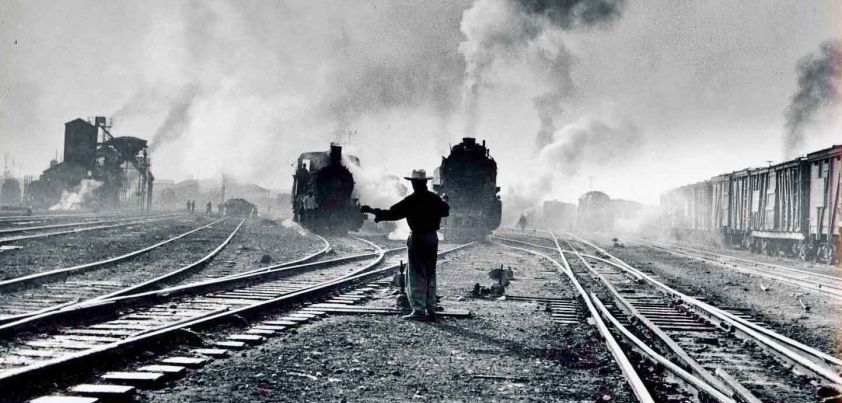 In this story by Juan José Arreola, a man waiting for a train in Mexico is interrupted by a retired switchman who tells him that has little chance of getting to his destination. After outlining a long list of problems with the railway system and the hazards of using it, he “dissolves” at the sound of an approaching train whistle. The story has been variously labeled a satire of the Mexican railway system/government, and an existential horror story about the inability to exercise free will in a world governed by chance. Themes include absurdity, existentialism, corruption, determination, hope. More…
In this story by Juan José Arreola, a man waiting for a train in Mexico is interrupted by a retired switchman who tells him that has little chance of getting to his destination. After outlining a long list of problems with the railway system and the hazards of using it, he “dissolves” at the sound of an approaching train whistle. The story has been variously labeled a satire of the Mexican railway system/government, and an existential horror story about the inability to exercise free will in a world governed by chance. Themes include absurdity, existentialism, corruption, determination, hope. More…
MS. Found in a Bottle
 This story by Edgar Allan Poe is an MS. (manuscript) found in a bottle tossed into the ocean by a dying man. After outlining his once rational, skeptical outlook on life, he relates the story of how, after a series of misadventures at sea, he found himself on a huge ghost galleon speeding under full sail towards the South pole. He walks around the ship unseen by its crew of infirm old men, who become increasingly excited as they approach their doom. Themes include the power of nature, fear, exploration, rational thinking vs. the supernatural, compulsion to document the unexplainable. More…
This story by Edgar Allan Poe is an MS. (manuscript) found in a bottle tossed into the ocean by a dying man. After outlining his once rational, skeptical outlook on life, he relates the story of how, after a series of misadventures at sea, he found himself on a huge ghost galleon speeding under full sail towards the South pole. He walks around the ship unseen by its crew of infirm old men, who become increasingly excited as they approach their doom. Themes include the power of nature, fear, exploration, rational thinking vs. the supernatural, compulsion to document the unexplainable. More…
The Homecoming Stranger
 In this story by Bei Dao, a young woman in 1970s China has difficulty dealing with her father’s homecoming after being falsely convicted of literary crimes and spending twenty years in prison. She feels resentment, not only over what she sees as his ‘desertion’, but also over her mother standing by when she was imprisoned and tortured at age twelve. Fortunately, on coming to understand her father’s love and the courage he had showed, she realizes her selfishness and they reconcile. Themes include the unfairness and brutality of the Mao regime, resentment, hypocrisy, rejection, fatherly love, courage, selfishness, forgiveness, reconciliation. More…
In this story by Bei Dao, a young woman in 1970s China has difficulty dealing with her father’s homecoming after being falsely convicted of literary crimes and spending twenty years in prison. She feels resentment, not only over what she sees as his ‘desertion’, but also over her mother standing by when she was imprisoned and tortured at age twelve. Fortunately, on coming to understand her father’s love and the courage he had showed, she realizes her selfishness and they reconcile. Themes include the unfairness and brutality of the Mao regime, resentment, hypocrisy, rejection, fatherly love, courage, selfishness, forgiveness, reconciliation. More…
Victory
 The enigmatic nature of this Vasily Aksyonov story about a casual chess game between a Russian grandmaster and a chance acquaintance stems from its interwoven motifs. Allegorically, the game represents a battle between the intelligentsia (the well-travelled, Dior-wearing grandmaster) and the common people (the brutish stranger). Additionally, as the game progresses the narration is interlaced with temporal shifts where the grandmaster experiences grim visions of desolation, hiding, escape and death. As he is about to be executed in the last vision, his opponent shouts “checkmate”. Themes include Western influence on Russian culture, class struggle, memories, insecurity, fear, ‘victory’ in survival. More…
The enigmatic nature of this Vasily Aksyonov story about a casual chess game between a Russian grandmaster and a chance acquaintance stems from its interwoven motifs. Allegorically, the game represents a battle between the intelligentsia (the well-travelled, Dior-wearing grandmaster) and the common people (the brutish stranger). Additionally, as the game progresses the narration is interlaced with temporal shifts where the grandmaster experiences grim visions of desolation, hiding, escape and death. As he is about to be executed in the last vision, his opponent shouts “checkmate”. Themes include Western influence on Russian culture, class struggle, memories, insecurity, fear, ‘victory’ in survival. More…
Because He Loved Them
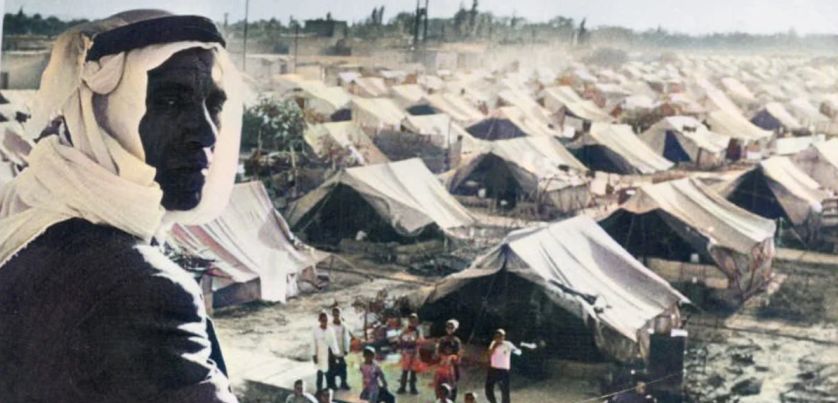 This story by Samira Azzam highlights the catastrophic effect of the 1948 creation of Israel on the half-million plus Palestinians it displaced. A man working in a government food distribution agency is wrongly suspected of embezzlement. He documents two examples of lives ruined by the partition and the story of a “sonofabithch” camp informer who profited by it, then torches a food warehouse. He believes that if his people are hungry enough they will rise up and rebel, and claims to have done this “because he loves them”. Themes include displacement, corruption, injustice, suffering, violence, betrayal, rebellion. More…
This story by Samira Azzam highlights the catastrophic effect of the 1948 creation of Israel on the half-million plus Palestinians it displaced. A man working in a government food distribution agency is wrongly suspected of embezzlement. He documents two examples of lives ruined by the partition and the story of a “sonofabithch” camp informer who profited by it, then torches a food warehouse. He believes that if his people are hungry enough they will rise up and rebel, and claims to have done this “because he loves them”. Themes include displacement, corruption, injustice, suffering, violence, betrayal, rebellion. More…
The Girls
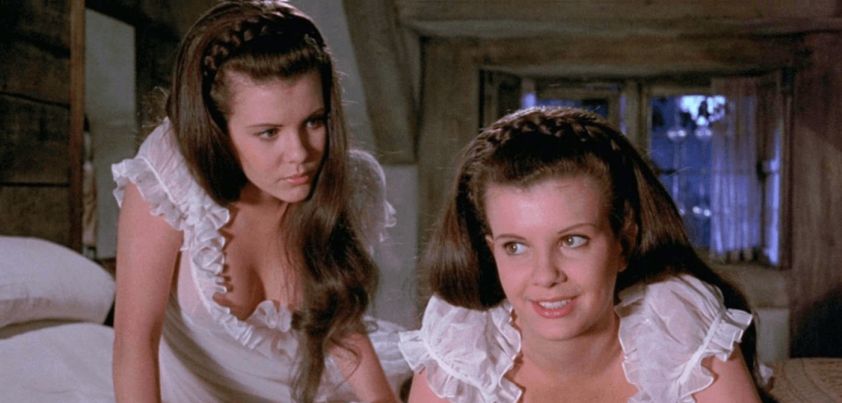 The evil, narcissistic, thirty-something sisters in this story by Joy Williams act more like petulant children than adults. They have no friends and no interest in boys, have never worked, and don’t intend to. Although concerned about the health of their wealthy parents crumbling in their eyes, they heartlessly manipulate them and delight in humiliating and driving away their houseguests. After revealing a damning family secret at a cocktail party, an intuitive houseguest points out too late that the girls’ behavior is killing their mother. Themes include family dysfunction, arrested development, narcissism, evil, cruelty, death, grief. More…
The evil, narcissistic, thirty-something sisters in this story by Joy Williams act more like petulant children than adults. They have no friends and no interest in boys, have never worked, and don’t intend to. Although concerned about the health of their wealthy parents crumbling in their eyes, they heartlessly manipulate them and delight in humiliating and driving away their houseguests. After revealing a damning family secret at a cocktail party, an intuitive houseguest points out too late that the girls’ behavior is killing their mother. Themes include family dysfunction, arrested development, narcissism, evil, cruelty, death, grief. More…
The Cop and the Anthem
 Written in 1904, the major theme of this story by O. Henry (the plight of the homeless) is perhaps even more relevant today. A homeless man who lives on the streets in the warmer months tries in vain to commit a petty crime so he can spend the winter in prison. After trying every trick he knows to get arrested, he stops outside a church. The ambience and stirring music being played bring about an epiphany, thoughts of reform … and jail. Other themes include social class, crime and punishment, resilience, poverty mindset vs. ambition and hope. More…
Written in 1904, the major theme of this story by O. Henry (the plight of the homeless) is perhaps even more relevant today. A homeless man who lives on the streets in the warmer months tries in vain to commit a petty crime so he can spend the winter in prison. After trying every trick he knows to get arrested, he stops outside a church. The ambience and stirring music being played bring about an epiphany, thoughts of reform … and jail. Other themes include social class, crime and punishment, resilience, poverty mindset vs. ambition and hope. More…
Sunbird
 Once you get used to the preposterous names and characters, this Neil Gaiman story is a fascinating read. The five members of an exclusive club dedicated to tasting exotic food travel to Suntown in Cairo to capture and eat a rare Sunbird. They kill and cook the bird (which turns out to be a phoenix), and thoroughly enjoy the meal. Unfortunately, for all but one of them, it is their last. Themes include gluttony, exploitation (of vulnerable species), deception, the danger of seeking pleasure from the unknown, transformation and the enduring cycle of life, the supernatural. More…
Once you get used to the preposterous names and characters, this Neil Gaiman story is a fascinating read. The five members of an exclusive club dedicated to tasting exotic food travel to Suntown in Cairo to capture and eat a rare Sunbird. They kill and cook the bird (which turns out to be a phoenix), and thoroughly enjoy the meal. Unfortunately, for all but one of them, it is their last. Themes include gluttony, exploitation (of vulnerable species), deception, the danger of seeking pleasure from the unknown, transformation and the enduring cycle of life, the supernatural. More…
Mechanopolis
 In this story by Miguel De Unamuno a man dying of thirst in a desert is saved when he stumbles upon an oasis in which there is a mysterious train station. He boards a seemingly empty, waiting train and is whisked off to a magnificent, deserted, fully functioning city of the future. The city’s machines and infrastructure continue to operate with no apparent human involvement. His curiosity turns to horror when he realizes the machines are sentient and concerned about his psychological and emotional state. Themes include human extinction, the ascendency of sentient machines, loneliness, paranoia, mental instability. More…
In this story by Miguel De Unamuno a man dying of thirst in a desert is saved when he stumbles upon an oasis in which there is a mysterious train station. He boards a seemingly empty, waiting train and is whisked off to a magnificent, deserted, fully functioning city of the future. The city’s machines and infrastructure continue to operate with no apparent human involvement. His curiosity turns to horror when he realizes the machines are sentient and concerned about his psychological and emotional state. Themes include human extinction, the ascendency of sentient machines, loneliness, paranoia, mental instability. More…
Soldier’s Home
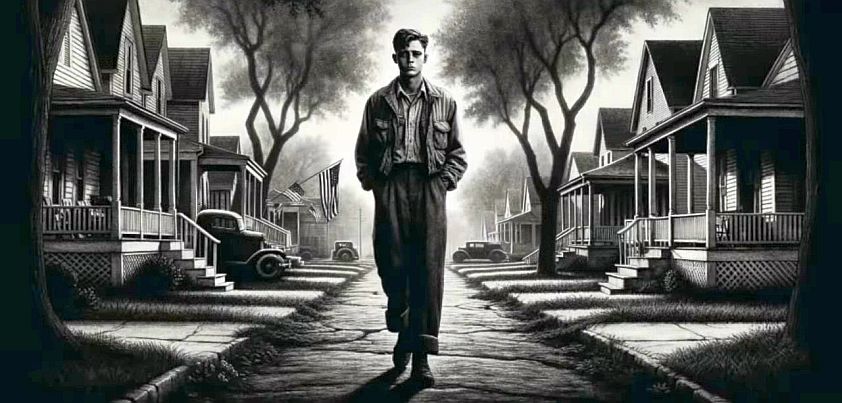 This story by Ernest Hemingway about an American soldier’s difficulty “fitting in” after returning from World War 1 is a wonderful example of the author’s Iceberg Theory, with much of the protagonist’s background hidden from readers. Upon return, the soldier finds himself alienated from his culture, community, friends, and family. He falls into depression and lethargy, obsessed with watching local girls go by, but avoiding contact with them. This may be due to an earlier failed relationship, or his distaste for his pious, controlling mother. Themes include PTSD, alienation, cultural and social change, fear of involvement and commitment. More…
This story by Ernest Hemingway about an American soldier’s difficulty “fitting in” after returning from World War 1 is a wonderful example of the author’s Iceberg Theory, with much of the protagonist’s background hidden from readers. Upon return, the soldier finds himself alienated from his culture, community, friends, and family. He falls into depression and lethargy, obsessed with watching local girls go by, but avoiding contact with them. This may be due to an earlier failed relationship, or his distaste for his pious, controlling mother. Themes include PTSD, alienation, cultural and social change, fear of involvement and commitment. More…
The Greatest Gift
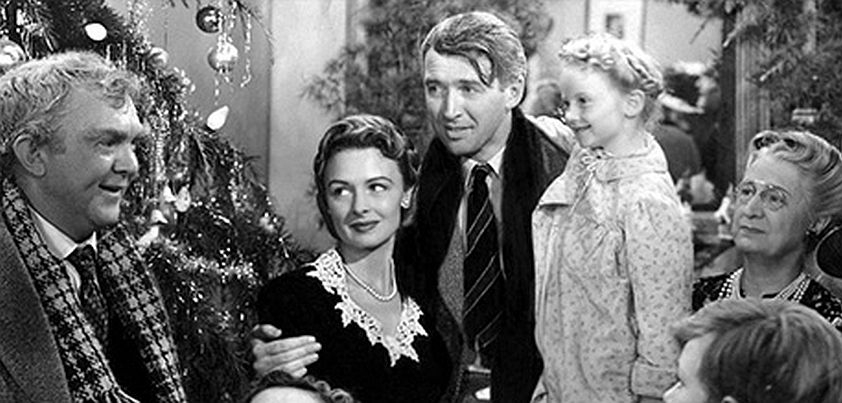 This story by Philip Van Doren Stern was the inspiration for the classic Christmas movie It’s a Wonderful Life. A depressed man standing on a bridge contemplating suicide confides to a stranger who joins him that he wishes he had never been born. His wish is mysteriously granted and he learns that, without his existence, his loved ones and the whole community would have suffered greatly. As he begs to be returned to his old self, he learns that God’s greatest gift of all is the gift of life. The major theme: every life has meaning and value. More…
This story by Philip Van Doren Stern was the inspiration for the classic Christmas movie It’s a Wonderful Life. A depressed man standing on a bridge contemplating suicide confides to a stranger who joins him that he wishes he had never been born. His wish is mysteriously granted and he learns that, without his existence, his loved ones and the whole community would have suffered greatly. As he begs to be returned to his old self, he learns that God’s greatest gift of all is the gift of life. The major theme: every life has meaning and value. More…
The Address
 Major themes of this story by Marga Minco are trust, betrayal, connection, and letting go. A young Jewish woman, the only member of her family to survive World War 2, visits a ‘friend’ of her mother’s with whom she had entrusted family valuables for safekeeping during the war. Her purpose is to ‘see, touch and remember’ the items, and perhaps to reclaim some to decorate her small rented room. The woman initially rebuffs her, and when she later returns and is admitted by the woman’s daughter, she sees her family’s prize possessions displayed and in daily use around the house. More…
Major themes of this story by Marga Minco are trust, betrayal, connection, and letting go. A young Jewish woman, the only member of her family to survive World War 2, visits a ‘friend’ of her mother’s with whom she had entrusted family valuables for safekeeping during the war. Her purpose is to ‘see, touch and remember’ the items, and perhaps to reclaim some to decorate her small rented room. The woman initially rebuffs her, and when she later returns and is admitted by the woman’s daughter, she sees her family’s prize possessions displayed and in daily use around the house. More…
Snowstorm
 This story by Bruna Dantas Lobato describes the experiences of a Brazilian college student studying in Vermont after a snowstorm. The focus of the story is the girl’s relationship with her anxious mother, with whom she speaks daily over Skype. The girl has remained in her dorm over the winter break and as expected, her mother issues warnings about every possible danger, fuelled by media reports and watching horror movies. The girl is equally concerned for her mother, who appears to be having more difficulty coping with the separation than she is. Themes include mother-daughter connection, separation anxiety, isolation and loneliness. More…
This story by Bruna Dantas Lobato describes the experiences of a Brazilian college student studying in Vermont after a snowstorm. The focus of the story is the girl’s relationship with her anxious mother, with whom she speaks daily over Skype. The girl has remained in her dorm over the winter break and as expected, her mother issues warnings about every possible danger, fuelled by media reports and watching horror movies. The girl is equally concerned for her mother, who appears to be having more difficulty coping with the separation than she is. Themes include mother-daughter connection, separation anxiety, isolation and loneliness. More…
Wakefield
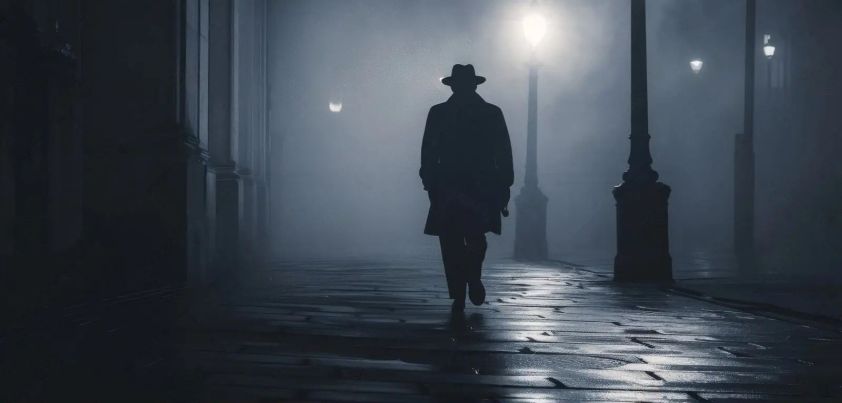 This Nathaniel Hawthorne story opens with a newspaper account of a man who ‘disappeared’ after telling his wife he was going on a week’s holiday, stalked her for twenty years, and then returned home as if nothing had happened. The narrator speculates that the man’s ‘holiday’ may have been a cruel joke to see how his wife would cope without him, and that he gradually became so enamoured with the isolated, clandestine existence that he found it difficult to return home to his former life. Themes include singularity, alienation and isolation, resilience (the wife’s life goes on), obsession, insignificance. More…
This Nathaniel Hawthorne story opens with a newspaper account of a man who ‘disappeared’ after telling his wife he was going on a week’s holiday, stalked her for twenty years, and then returned home as if nothing had happened. The narrator speculates that the man’s ‘holiday’ may have been a cruel joke to see how his wife would cope without him, and that he gradually became so enamoured with the isolated, clandestine existence that he found it difficult to return home to his former life. Themes include singularity, alienation and isolation, resilience (the wife’s life goes on), obsession, insignificance. More…
The Lottery
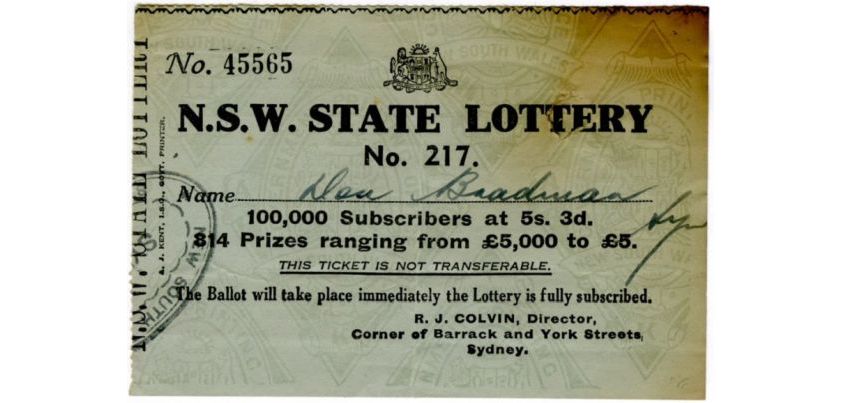 This story by Marjorie Barnard is set in 1930s Sydney. On the protagonist’s way home from work, friends draw his attention to a newspaper report that his wife has won first prize in a lottery. His initial reaction is to wonder “Why didn’t she contact him at work? and Where did she get the money? He later reflects on how great his wife and married life are, albeit in terms of gender norms of the day. When he gets home, his wife’s reaction to the win is not what he had expected. Themes include patriarchy, gender roles, complacency, alienation, rebellion. More…
This story by Marjorie Barnard is set in 1930s Sydney. On the protagonist’s way home from work, friends draw his attention to a newspaper report that his wife has won first prize in a lottery. His initial reaction is to wonder “Why didn’t she contact him at work? and Where did she get the money? He later reflects on how great his wife and married life are, albeit in terms of gender norms of the day. When he gets home, his wife’s reaction to the win is not what he had expected. Themes include patriarchy, gender roles, complacency, alienation, rebellion. More…
Native Land / Lupang Tinubuan
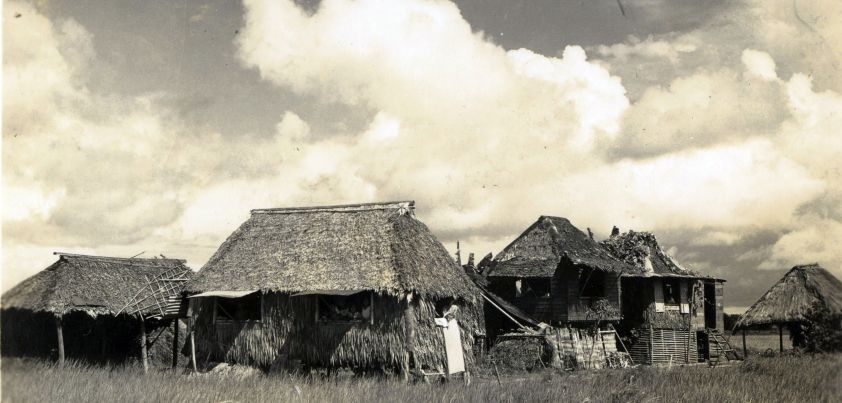 Although this Narciso G. Reyes story was directed towards a Filipino audience, its major theme (connection to and love for one’s traditional lands) applies equally to many other cultures. A young boy accompanies an uncle and aunt to a funeral in his father’s home village. He bonds with extended family he has never met, connects with his father’s childhood, and comes to love and find peace in the land a carriage driver had described as having nothing beautiful except the sky. Other themes include identity, nostalgia, death and grief, colonialism and the need to fight for freedom. More…
Although this Narciso G. Reyes story was directed towards a Filipino audience, its major theme (connection to and love for one’s traditional lands) applies equally to many other cultures. A young boy accompanies an uncle and aunt to a funeral in his father’s home village. He bonds with extended family he has never met, connects with his father’s childhood, and comes to love and find peace in the land a carriage driver had described as having nothing beautiful except the sky. Other themes include identity, nostalgia, death and grief, colonialism and the need to fight for freedom. More…
Cold Spring
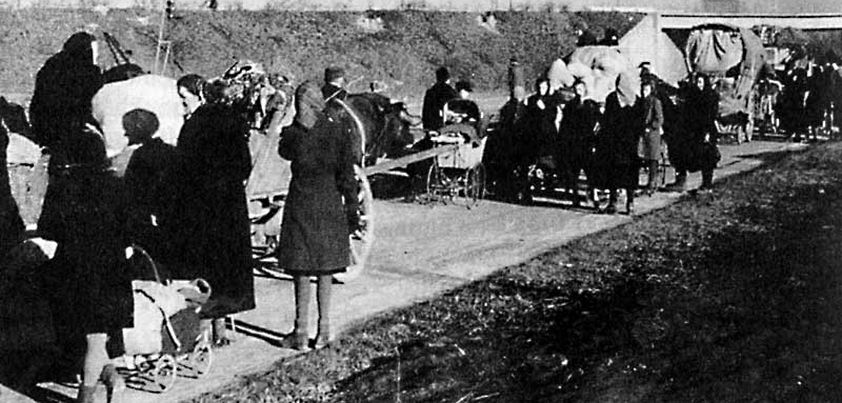 This story by Aharon Appelfeld describes the emergence of six Jews from their forest hiding place at the end of World War 2. Each has been physically or mentally scarred by the experience. One rushes off immediately, but the others are reluctant to move. They feast on food and alcohol abandoned by departing soldiers, leaving only when thawing snow fills their bunker with water. They then join a long line of refugees, their presence among whom is met with surprise, prejudice and kindness. Themes include camaraderie, survival, the aftermath of war, uncertainty, superstition/sorcery, hope. More…
This story by Aharon Appelfeld describes the emergence of six Jews from their forest hiding place at the end of World War 2. Each has been physically or mentally scarred by the experience. One rushes off immediately, but the others are reluctant to move. They feast on food and alcohol abandoned by departing soldiers, leaving only when thawing snow fills their bunker with water. They then join a long line of refugees, their presence among whom is met with surprise, prejudice and kindness. Themes include camaraderie, survival, the aftermath of war, uncertainty, superstition/sorcery, hope. More…
Midnight Mass
 This story, hailed as one of Joaquim Maria Machado de Assis’s best, involves a seemingly innocent but sexually charged conversation between a seventeen-year-old boy and the thirty-year-old wife of his landlord. The boy is staying up to attend midnight mass, the woman’s husband is away for the night with his mistress, and the woman, who has not slept, appears in her nightgown. Interpretation of the conversation is made all the more difficult because it is related by the boy many years afterwards. Themes include coming of age (sexual stirrings) and ambiguity (as to what might be implied or is unsaid). More…
This story, hailed as one of Joaquim Maria Machado de Assis’s best, involves a seemingly innocent but sexually charged conversation between a seventeen-year-old boy and the thirty-year-old wife of his landlord. The boy is staying up to attend midnight mass, the woman’s husband is away for the night with his mistress, and the woman, who has not slept, appears in her nightgown. Interpretation of the conversation is made all the more difficult because it is related by the boy many years afterwards. Themes include coming of age (sexual stirrings) and ambiguity (as to what might be implied or is unsaid). More…
The Five-Forty-Eight
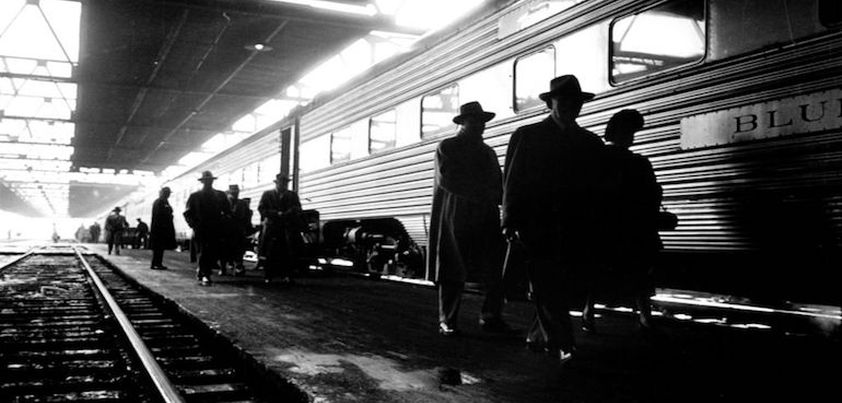 This story by John Cheever puts into perspective the plight of women in the workplace before the terms sexual harassment and unfair dismissal were coined. A disdainful, misogynistic businessman takes advantage of the attentions and weakness of a new secretary, then immediately has her fired. Six months later the woman, who appears mentally unstable, confronts him with a gun and avenges herself by humiliating the vile man. Sadly, although the woman’s actions may have helped her in regaining her self-respect, they seem to have little effect on the man. Themes include alienation/isolation, family, power, narcissism, misogyny, sexuality, revenge, mental illness. More…
This story by John Cheever puts into perspective the plight of women in the workplace before the terms sexual harassment and unfair dismissal were coined. A disdainful, misogynistic businessman takes advantage of the attentions and weakness of a new secretary, then immediately has her fired. Six months later the woman, who appears mentally unstable, confronts him with a gun and avenges herself by humiliating the vile man. Sadly, although the woman’s actions may have helped her in regaining her self-respect, they seem to have little effect on the man. Themes include alienation/isolation, family, power, narcissism, misogyny, sexuality, revenge, mental illness. More…
Lakshmi’s Adventure
 This story from Manoj Das contrasts the innocence of a six-year-old girl with the intolerance of her village priest and the hypocrisy of corrupt temple officials. After dreaming that her deity spoke to her, the girl sneaks into the temple and has a wide-ranging “discussion” with him, including his problems (hearing and too many bananas), hers (arithmetic), and her family’s (an aggressive money-lender). On leaving with two bananas from his shrine, she is chased by an angry mob into a pond in which she catches a fatal fever. Themes include innocence, faith, family, poverty, righteous indignation, guilt and remorse. More…
This story from Manoj Das contrasts the innocence of a six-year-old girl with the intolerance of her village priest and the hypocrisy of corrupt temple officials. After dreaming that her deity spoke to her, the girl sneaks into the temple and has a wide-ranging “discussion” with him, including his problems (hearing and too many bananas), hers (arithmetic), and her family’s (an aggressive money-lender). On leaving with two bananas from his shrine, she is chased by an angry mob into a pond in which she catches a fatal fever. Themes include innocence, faith, family, poverty, righteous indignation, guilt and remorse. More…
Weight
 In this story by John Edgar Wideman, a writer calls his mother and reads her a draft of a story he has written. It opens with the metaphor My mother is a weightlifter, and goes on to admire the way she has shouldered so many burdens throughout her life. She is not impressed. Two days later, she dies. As he reflects on the call he realizes it wasn’t the story that upset her, but his opening words: This is about a man scared he won’t survive his mother’s passing. Themes include motherhood, love, racial inequality, suffering, strength, dependence, grief, fear. More…
In this story by John Edgar Wideman, a writer calls his mother and reads her a draft of a story he has written. It opens with the metaphor My mother is a weightlifter, and goes on to admire the way she has shouldered so many burdens throughout her life. She is not impressed. Two days later, she dies. As he reflects on the call he realizes it wasn’t the story that upset her, but his opening words: This is about a man scared he won’t survive his mother’s passing. Themes include motherhood, love, racial inequality, suffering, strength, dependence, grief, fear. More…
The Key
 The major messages of this story by Isaac Bashevis Singer are that there is a lot of kindness in the world for those who open their hearts to it, and to live life to the fullest. An elderly widow who has lived alone for almost twenty years has become a recluse. With no family or friends, she distrusts everyone and lives in poverty despite having a fortune hidden in her house. A broken key that causes her to spend a night on the streets is her “key” to understanding and redemption. Themes include ageing, isolation and loneliness, paranoia, redemption. More…
The major messages of this story by Isaac Bashevis Singer are that there is a lot of kindness in the world for those who open their hearts to it, and to live life to the fullest. An elderly widow who has lived alone for almost twenty years has become a recluse. With no family or friends, she distrusts everyone and lives in poverty despite having a fortune hidden in her house. A broken key that causes her to spend a night on the streets is her “key” to understanding and redemption. Themes include ageing, isolation and loneliness, paranoia, redemption. More…
The Final Problem / Empty House
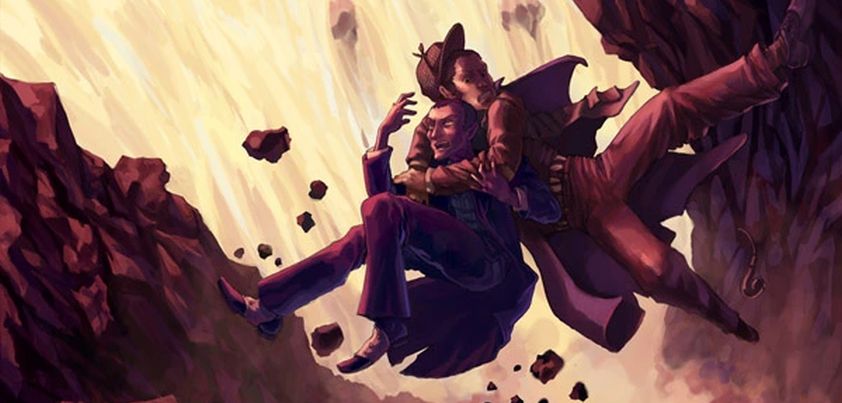 Today we have two stories by Arthur Conan Doyle dealing with the “death” and “rebirth” of Sherlock Holmes. In The Final Problem, Holmes has his first and last encounter with master criminal and his intellectual equal, Professor James Moriarty. After a pursuit across Europe, the pair are believed to have perished when they tumbled off the Reichenbach Falls during a struggle. In the Adventure of the Empty House, Holmes miraculously returns to bring three remaining members of Moriarty’s criminal network to justice. In capturing the first, he solves an important murder investigation. Themes include justice, pursuit, deception, courage, sacrifice, death. More…
Today we have two stories by Arthur Conan Doyle dealing with the “death” and “rebirth” of Sherlock Holmes. In The Final Problem, Holmes has his first and last encounter with master criminal and his intellectual equal, Professor James Moriarty. After a pursuit across Europe, the pair are believed to have perished when they tumbled off the Reichenbach Falls during a struggle. In the Adventure of the Empty House, Holmes miraculously returns to bring three remaining members of Moriarty’s criminal network to justice. In capturing the first, he solves an important murder investigation. Themes include justice, pursuit, deception, courage, sacrifice, death. More…
The Tiger
 In this moving tale by S. Rajaratnam, a pregnant Malay villager bathing in a river notices a tiger watching her from tall grass near the riverbank. Initially too scared to move, she is surprised as the tiger takes less and less interest in her. Eventually able to swim away, she immediately tells fellow villagers about the encounter. She feels uneasy when a party of men set out to shoot the apparently harmless animal, and is horrified by what they find after killing it. Themes include: fear, connection, compassion, bloodlust, motherhood, conservation (co-existence with vs. destruction/exploitation of nature). More…
In this moving tale by S. Rajaratnam, a pregnant Malay villager bathing in a river notices a tiger watching her from tall grass near the riverbank. Initially too scared to move, she is surprised as the tiger takes less and less interest in her. Eventually able to swim away, she immediately tells fellow villagers about the encounter. She feels uneasy when a party of men set out to shoot the apparently harmless animal, and is horrified by what they find after killing it. Themes include: fear, connection, compassion, bloodlust, motherhood, conservation (co-existence with vs. destruction/exploitation of nature). More…
She
 This story by Jason Brown contrasts the platonic first love a junior high schooler feels for the boy she has been going with since sixth grade to intense feelings she develops for a classmate with a “bad boy” reputation. Initially, the new relationship appears perfect as he treats her with respect and they discuss dreams and plans for the future. However, things take a potentially tragic turn when, confused and ashamed, she calls it off after experiencing a moment of sexual arousal during a petting session in the backseat of a car. Themes: love, sexuality, desire, passion, guilt, shame, retribution. More…
This story by Jason Brown contrasts the platonic first love a junior high schooler feels for the boy she has been going with since sixth grade to intense feelings she develops for a classmate with a “bad boy” reputation. Initially, the new relationship appears perfect as he treats her with respect and they discuss dreams and plans for the future. However, things take a potentially tragic turn when, confused and ashamed, she calls it off after experiencing a moment of sexual arousal during a petting session in the backseat of a car. Themes: love, sexuality, desire, passion, guilt, shame, retribution. More…
The Well
 In this story by Mariana Enríquez, a six-year-old girl changes dramatically after a family visit to a supposed witch. She develops a series of severe phobias that make it impossible to leave her house and live a normal childhood. In her teens, her older sister tells her that the witch’s visit cured her mother, grandmother and herself of similar fears. Seeking help, they revisit the witch and learn that her family had had the witch cast an irreversible spell transferring the “old evils” inhabiting themselves to the girl. Themes include irrational terror, demonic possession, betrayal, despair, the supernatural. More…
In this story by Mariana Enríquez, a six-year-old girl changes dramatically after a family visit to a supposed witch. She develops a series of severe phobias that make it impossible to leave her house and live a normal childhood. In her teens, her older sister tells her that the witch’s visit cured her mother, grandmother and herself of similar fears. Seeking help, they revisit the witch and learn that her family had had the witch cast an irreversible spell transferring the “old evils” inhabiting themselves to the girl. Themes include irrational terror, demonic possession, betrayal, despair, the supernatural. More…
My Oedipus Complex
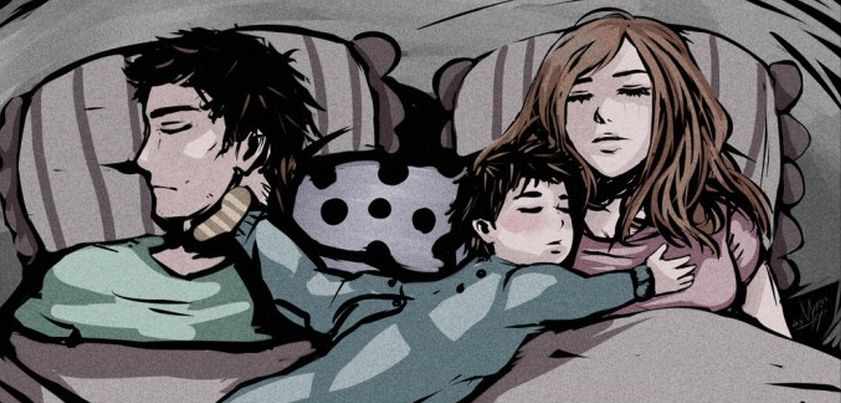 The term Oedipus Complex has its roots in psychology and Greek Mythology. In this coming of age story by Frank O’Connor, a five-year-old boy’s ordered life and close attachment to his mother are disrupted, firstly by his father’s return from World War 1, and later by the birth of a baby brother. During the war, the boy’s father is a mysterious, occasional visitor to be prayed for. On his return, his father becomes a fierce rival for his mother’s attentions and later, a fellow victim of the newborn’s demands. Themes include childhood innocence and imagination, mother/father-son relationships, jealousy, anger, understanding. More…
The term Oedipus Complex has its roots in psychology and Greek Mythology. In this coming of age story by Frank O’Connor, a five-year-old boy’s ordered life and close attachment to his mother are disrupted, firstly by his father’s return from World War 1, and later by the birth of a baby brother. During the war, the boy’s father is a mysterious, occasional visitor to be prayed for. On his return, his father becomes a fierce rival for his mother’s attentions and later, a fellow victim of the newborn’s demands. Themes include childhood innocence and imagination, mother/father-son relationships, jealousy, anger, understanding. More…